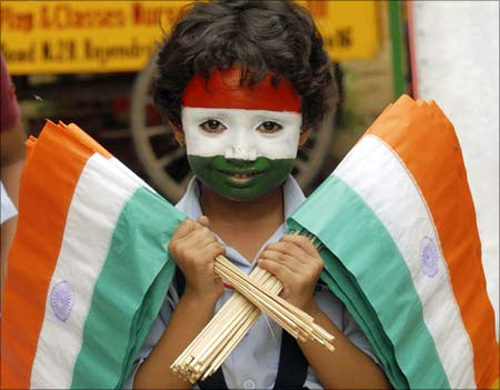'Secularism as a principle and practice is in danger'
'The Congress party makes a distinction between Hinduism and Hindutva'

Secularism as a principle and practice in India is in "danger", but "forces of hatred" cannot alter the country's secular character, senior Congress leader Shashi Tharoor said during an interview on his new book 'The Battle of Belonging'.
In the book, Tharoor makes a stinging critique of the Hindutva doctrine, asserting that it is a political doctrine, not a religious one.
Here are some excerpts from the interview:
In your book you have vehemently argued against the Hindutva idea of India. But with BJP's meteoric rise and electoral success, would you concede that a majority of the country is not against Hindutva as many liberals make out to be. What are the reasons for Hindutva's popularity?
I don't agree, because the 37 per cent vote won by the BJP last year is not a majority! Yes, Hindutva has successfully exploited fear of the 'Other', just as most reactionary ideologies do. The Hindutva ideologues in power have also had no qualms about appropriating or undermining the ostensibly independent branches of governance, from the autonomous bodies like the Election Commission or the RTI commissioners or the Reserve Bank to even media and the courts, in the service of their version of nationalism. This creates a sort of self-reinforcing echo chamber, in which the government is able to constantly push Hindutva ideas.
That is why I would caution against the idea of Hindutva being 'popular', as you suggest. How can we tell? Sure, the BJP holds a commanding parliamentary majority, but it has worked overtime to suppress dissenting voices. In that sense, it is difficult to get an accurate gauge of support for Hindutva among ordinary Indians. I do not think that a majority of the country supports the hateful rhetoric and exclusionary nature of Hindutva.
With Hindutva now a reality in mainstream politics and often setting the agenda, do you think opposition parties including Congress have been forced to peddle in soft Hindutva or 'Hindutva Lite' at some point in time or the other.
Judging by the number of times I have been asked this question, I do recognise that there's a very real and tangible concern for some liberal Indians. But as I have often pointed out, we in the Congress party are very clear that we cannot allow ourselves to become a BJP-Lite. I have long argued that any attempt to emulate 'Pepsi Lite' by 'BJP Lite' will end up with us becoming like 'Coke Zero' -- that is, Congress Zero. Congress is not BJP in any shape or form, and we should not attempt to be a lighter version of something we are not. Nor are we trying to, in my view.
The Congress party makes a distinction between Hinduism and Hindutva. The Hinduism we respect is inclusive and non-judgemental, whereas Hindutva is a political doctrine based on exclusion. So we are not offering a watered-down version of the BJP's political messaging: Rahul Gandhi has made it explicitly clear that, for all his avowing his personal Hinduism by going to temples, he does not support any form of Hindutva, neither soft nor hard.
As a Congressman, I understand that whereas Hinduism is a religion, which is the personal concern of every individual, Hindutva is a political doctrine that departs fundamentally from the principal tenets of my Hindu faith. While Hinduism is inclusive of all ways of worship, Hindutva is indifferent to devotion and cares principally about identity. Hinduism is open to reform and progress, which is why it has flourished for 4,000 years; Hindutva is reactionary and regressive, with its roots in the 'racial pride' ethos that spawned Fascism in the 1920s, which is why it is unlikely to outlast its current peak this century.
Do you think as an antidote to the Hindutva agenda, Congress needs to talk about secularism more often than it has been doing of late. Has secularism become a sort of bad word not used even by the opposition much.
I disagree with the assertion that Congress has not talked about secularism enough. We have at every opportunity stressed our unshakeable commitment to secularism -- not as distancing from religion but encouraging all to flourish -- and the party's glorious heritage of advocating freedom of religion has sustained and strengthened over time. Politically and personally, we embrace the acceptance of difference. I think that the spirit of Indian secularism is alive and well, both in the Congress party and in the country at large, and we are striving every day to ensure that it is safeguarded from those who seek to erode it.

You have also talked about the abrogation of Article 370 and violation of rights in Kashmir at length in your book. P Chidambaram recently called for the restoration of Article 370 and was attacked by the BJP. What are your views on the issue?
I have already articulated my stand clearly within the walls of Parliament and it is a matter of public record. It's not just an issue of abrogating 370 -- even Nehruji had said the provision was a temporary one. But the Constitution specifies how it is to be done. So though it shouldn't matter what side of the debate on Article 370 you stand on -- after all, differing voices are the lifeline of any democracy -- the manner in which it was implemented, the way our own fellow citizens were overnight clamped down upon by their own government, consciously and willfully disregarding the democratically enshrined rights guaranteed to all Indians, does not bode well for the future of our country. No political objective can justify the huge-scale abuse of the rights of Indian citizens in this manner.
Maharashtra Governor Bhagat Singh Koshyari took a dig at Uddhav Thackrey over secularism. Do you think the word secularism in our Constitution is in imminent danger?
Yes, I suggested he should be given a different letterhead to express such ideas, rather than the official Raj Bhavan notepaper!
The word (secularism) is only a word; but even if the government takes the word 'secularism' out of the Constitution, it is still a secular Constitution. After all, freedom of worship, freedom to profess and propagate your religion, freedom of expression, minority rights, and equality of all citizens, are all part of the basic structure of the Constitution. They can't disappear by deleting a word. The ruling dispensation may well try to do that: there is certainly a concerted effort to erode secularism and replace it with a sectarian way of being that offers no place to religious minorities in Indian society. Secularism as principle and practice is in danger, but I do not see it falling anytime soon: India embodies tolerance and pluralism in its very essence, and I do not believe that forces of hatred can permanently overcome our fundamental secularism.
But we must not let our guard down; we must continue to oppose such regressive ideas wherever they arise. My book is a contribution to that effort and to reclaiming nationalism and patriotism for those, like me, who would extend the embrace of these terms to all Indians.
With the focus on jobs in the Bihar polls, do you think the result of the Bihar assembly election could be an indicator of economic issues taking precedence over more emotive issues like those of nationalism for the common man?
It remains to be seen! State issues involve verdicts on state governments' performance. But with Mr Modi campaigning for the BJP and his party raising Pakistan and nationalism as issues too, one cannot escape those topics either. We will have to learn from the results whether the voter was swayed.











 © 2025
© 2025